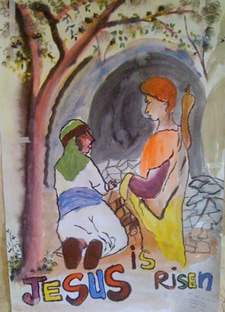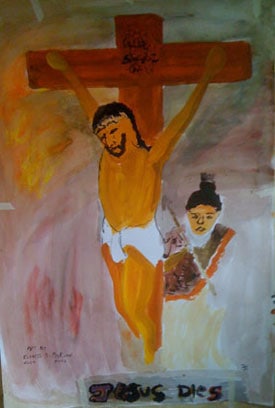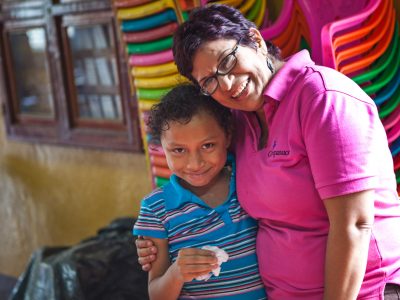
How Are Children Told That They Have Been Sponsored?
Once a child is fully enrolled in our sponsorship program, each of our partner countries begins working to link the child with a sponsor. Watch what it’s like for little Keylin in Nicaragua as she receives the news that she now has a sponsor.
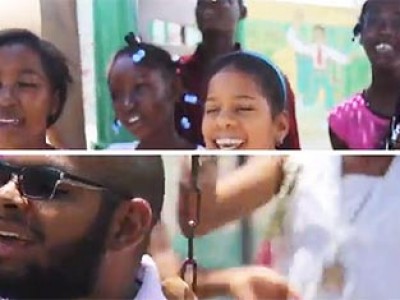
Jesus Loves Me
The sound of children singing praise to Jesus has to be one of the most beautiful sounds. The joy that comes from a relationship with Jesus shows when the children sing.
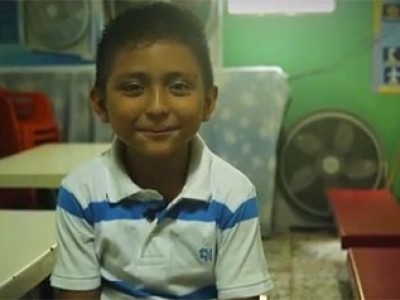
“I’m Not Broke”
The lies of poverty tell a child that they are broke, unfixable and hopeless. But then there is Jesus. And Jesus tells a very different story.
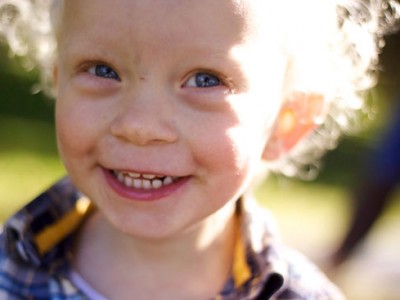
God Prepares Our Hearts to Answer His Call
Although I would struggle with letting go of control, God showed me from the start that this was His work to do and I was able to go back to that truth every time things got really hard.
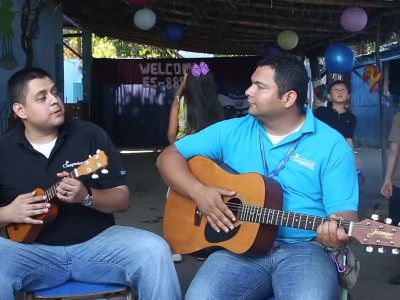
How Happy Are People Who Sponsor a Child?
How happy are people who sponsor a child? Well, they’re happier than…
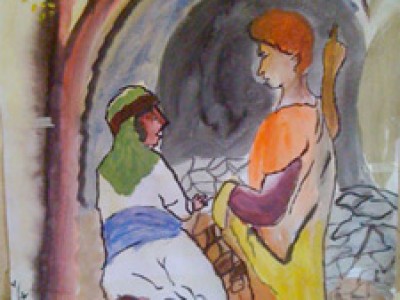
He Is Risen!
Hallelujah! Hosanna!
After the Sabbath, at dawn on the first day of the week, Mary Magdalene and the other Mary went to look at the tomb.
There was a violent earthquake, for an angel of the Lord came down from heaven and, going to the tomb, rolled back the stone and sat on it. His appearance was like lightning, and his clothes were white as snow. The guards were so afraid of him that they shook and became like dead men.
The angel said to the women, “Do not be afraid, for I know that you are looking for Jesus, who was crucified. He is not here; he has risen, just as he said. Come and see the place where he lay. Then go quickly and tell his disciples: ‘He has risen from the dead and is going ahead of you into Galilee. There you will see him.’ Now I have told you.”
So the women hurried away from the tomb, afraid yet filled with joy, and ran to tell his disciples. Suddenly Jesus met them. “Greetings,” he said. They came to him, clasped his feet and worshiped him. – Matthew 28:1-9 (NIV)
Guatemala, a country whose whose religion is chiefly Roman Catholic and Protestant, is deeply rooted in local traditions, making the celebration of Easter a colorful and massive one.
- Read about Easter in Guatemala.
To Ghanaian Christians, Easter is a day of remembering what Christ did on the cross for all mankind; not just remembering but knowing that it was the foundation for their salvation.
- Read about Easter in Ghana.
Easter Week in El Salvador is celebrated differently than the way it is celebrated in the United States. There is a much a different atmosphere.
- Read about Easter in El Salvador.
To talk about Easter is to talk about Christianity, and for children in our development centers to talk about Easter in Peru is to talk about a variety of traditions.
- Read about Easter in Peru.
In Kenya, children look forward to a sumptuous Easter meal in the afternoon. Easter is the one day that most children get to eat a nice meal of chicken and have a soft drink to accompany it.
- Read about Easter in Kenya.
Easter weekend is a time of great celebration in Haiti. As in some other aspects of Haitian life, it’s a combination of Catholic and voodoo tradition.
- Read about Easter in Haiti.
Alive in Christ
Christ has died. And we are united with Him in his death.
I have been crucified with Christ and I no longer live, but Christ lives in me. The life I now live in the body, I live by faith in the Son of God, who loved me and gave himself for me. – Galatians 2:20 (NIV)
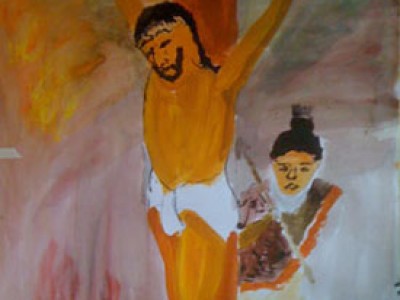
The Crucifixion of Jesus Christ
Compassion is closed today to honor Christ’s sacrifice on the cross.
It was the day of Preparation of Passover Week, about the sixth hour.
“Here is your king,” Pilate said to the Jews.
But they shouted, “Take him away! Take him away! Crucify him!”
“Shall I crucify your king?” Pilate asked.
“We have no king but Caesar,” the chief priests answered.
Finally Pilate handed him over to them to be crucified.
The Crucifixion
So the soldiers took charge of Jesus. Carrying his own cross, he went out to the place of the Skull (which in Aramaic is called Golgotha). Here they crucified him, and with him two others — one on each side and Jesus in the middle.
— John 19:17-18 (NIV)
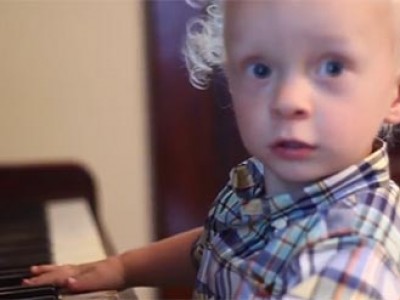
You will Fall in Love with this Child – Guaranteed!
Judah’s funny, full of life, joyful and silly. And you are going to fall in love with him — guaranteed!
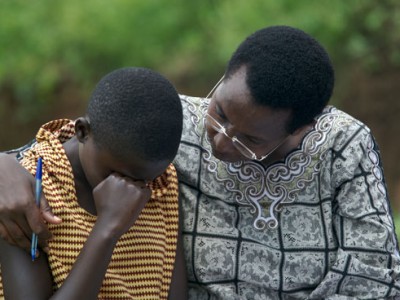
Rwandan Genocide: Where Were God’s People?
At the time of the Rwandan genocide in 1994, Gary Haugen, a senior trial attorney for the U.S. Department of Justice, was given an assignment to serve as the Officer in Charge of the U.N.’s genocide investigation in Rwanda.
He had seen a lot of injustice in the past, working to combat human rights abuses around the world. And in Rwanda, he stood amid it. He led a team in gathering evidence against those who perpetrated the genocide.
He didn’t just fight a legal battle from afar; he stood at the sites of mass murder and mass graves, and looked into the ugliness of this world.
And his response to it was quite surprising to me.
When you are standing in a mass grave in Rwanda, the question that came to my mind was not the question that was coming to everyone else’s mind perhaps. I’ve had people ask me, Where was God in the midst of all of this?’ But I could sense, at least from Scripture, what I knew of my heavenly Father, was that I knew where God was: He was right in the midst of all that incredible suffering. The more relevant question for me was, ‘Where are God’s people?’
What I also saw so clearly was the biblical mandate, because when you go through Scripture with an eye for that, all of a sudden there are these very clear commands: Micah 6:8, ‘He has told you, O man what is good and what the Lord requires of you, but to do justice, to love mercy, to walk humbly with your God,’ or Isaiah 1:17, ‘Seek justice, rescue the oppressed, defend the orphan, plead for the widow.'”
– Excerpted from RELEVANT magazine, “A Call to Justice,” March/April 2007 with permission.
Rather than raging at God, like I sometimes feel tempted to do, Haugen knew that this was a matter for the church. It was our responsibility to do justice, to rescue the oppressed, to plead for the widows and orphans.
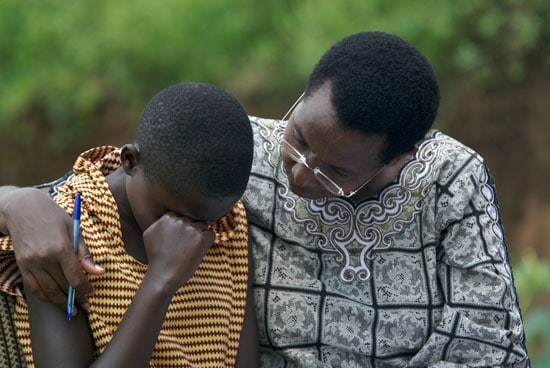
Laurent Mbanda is the Vice President of the Africa region for Compassion and also a native Rwandan. He wrote the book, Committed to Conflict: The Destruction of the Church in Rwanda, about the church in Rwanda and how it was involved in the genocide.
Rwandans had a common saying: ‘God spends the day somewhere else, but spends the night in Rwanda.’ To many, God left Rwanda on 6 April 1994 and did not come back until the final defeat of the Rwandan army by the RPF soldiers.
But not only did God seem to have left, some church leaders seemed to have allowed, blessed and even participated in the slaughter.
According to Mbanda, a history of prejudice and political involvement in the Rwandan church, dating back to Belgian colonial times and early Christian missionaries, set the stage for the unthinkable. Where were God’s people in the Rwandan genocide? Unbelievably, some were right there, supporting it.
What did Haugen do in response to what he saw?
I would have despaired. But fueled by what he saw, Haugen knew what he must do. He knew it was the church’s responsibility, our responsibility, not to wink at the injustices of the world, but to stop them. He founded the International Justice Mission, an organization that secures justice for victims of slavery, sexual exploitation and violent oppression in 12 countries around the world. This organization partners with us to help protect children who might not otherwise have someone to speak up for them.
What is your response when you read about the ugliness of the world? Do you want to close your eyes or just despair? It sure is tempting. But rather than giving up, Haugen went to the Scriptures to see what God’s call was on him, and he obeyed. He is now mobilizing the Church to be the ones who don’t look away, but who show up when the world needs it most.
Photo by Phoebe Graves
We originally published this post on April 6, 2009, the 15th anniversary of the genocide in Rwanda.
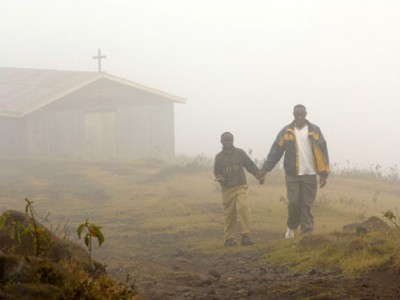
Break Through the Fog
As we prepare for the Easter season, there may be some of you who are in a place of fog. You can’t see clearly what’s ahead of you. You might even be wondering if God is with you at all because the fog has been with you for so long.

#BestDecisionEVER
Hashtags are a cultural phenomenon. And today we are having a little fun with our friend, the hashtag.

